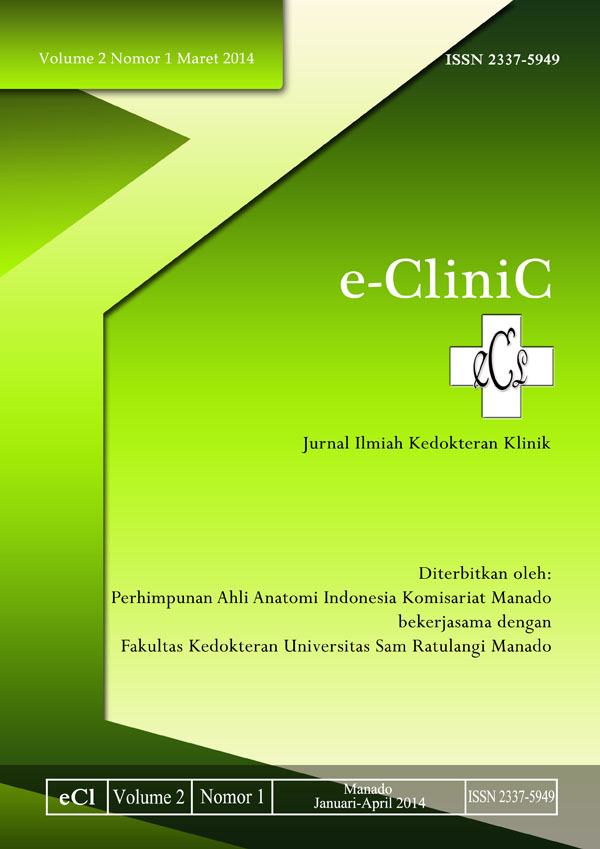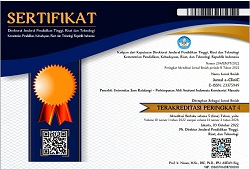HUBUNGAN TEKANAN DARAH DAN LAMA MENDERITA DIABETES DENGAN LAJU FILTRASI GLOMERULUS PADA SUBJEK DIABETES MELITUS TIPE 2
DOI:
https://doi.org/10.35790/ecl.v2i1.3600Abstract
Abstract: Diabetes Mellitus Type 2 is a metabolic disease that has been a problem in regards of world health. In Indonesia, the prevalence and incident of this disease keeps on increasing with each passing year. The increasing of blood pressure, more often than not, accompanies the case of diabetes mellitus. This causes the increase of both morbidity and mortality rate because it increases the risk of complications, in both macro-vascular and micro-vascular, one of which is nephropathy diabetic. Purpose: This research is aimed in understanding the correlation between blood pressure and the amount of period of suffering diabetes with glomerulus filtration rate in subject with diabetes mellitus type 2. Methods: The research method used is analytic descriptive with cross sectional approach using secondary data. The amount of sample is 152 patients of diabetes mellitus type 2, who came for treatment in Polyclinic Endocrine and Metabolic RSUP Prof. Dr. R. D. Kandou, Manado, during the period of November to December 2013. Conclusion: The result of the analysis using spearman’s correlation shows that there is a substantial correlation between blood pressure and glomerulus filtration rate (p=0,000) with negative direction, which means that the higher one’s blood pressure, the lower one’s glomerulus filtration rate is. Also, there is no substantial correlation regarding the period of suffering diabetes (p=0,971), because the glomerulus filtration rate doesn’t only depends on how long someone has been having diabetes, and instead there are another factors that are influencing the kidney’s function, for example: hypertension.
Keywords: blood pressure, glomerulus filtration rate, diabetes mellitus type 2
Â
Â
Abstrak: Diabetes Melitus tipe 2 merupakan penyakit metabolik yang telah menjadi masalah kesehatan dunia. Indonesia prevalensi dan insiden penyakit ini terus meningkat dari tahun ke tahun. Peningkatan tekanan darah sering menyertai penyakit diabetes melitus. Hal ini meningkatkan morbiditas dan mortalitas karena meningkatkan resiko terjadinya komplikasi baik makrovaskular dan mikrovaskular diantaranya nefropati diabetik. Tujuan: Penelitian ini bertujuan untuk mengetahui hubungan tekanan darah dan lama menderita diabetes dengan laju filtrasi glomerulus pada subjek diabetes melitus tipe 2. Metode: Jenis penelitian yang digunakan adalah deskriptif analitik dengan pendekatan cross sectional menggunakan data sekunder. Jumlah sampel sebanyak 152 pasien diabetes melitus tipe 2 yang berobat di Poliklinik Endokrin dan Metabolik RSUP Prof. Dr. R. D. Kandou Manado periode November - Desember 2013. Simpulan: Hasil analisis menggunakan spearman’s correlation menunjukkan bahwa ada hubungan yang bermakna antara tekanan darah dengan laju filtrasi glomerulus (p=0,000) dengan arah hubungan negatif yakni semakin tinggi tekanan darah maka filtrasi glomerulus semakin rendah, serta tidak ada hubungan bermakna dengan lama menderita diabetes (p=0,971) oleh karena laju filtrasi glomerulus tidak hanya bergantung pada lamanya menderita diabetes melainkan ada faktor lain yang mempengaruhi fungsi ginjal misalnya hipertensi.
Kata kunci: Tekanan darah, laju filtrasi glomerulus, diabetes melitus tipe 2
Downloads
How to Cite
Issue
Section
License
COPYRIGHT
Authors who publish with this journal agree to the following terms:
Authors hold their copyright and grant this journal the privilege of first publication, with the work simultaneously licensed under a Creative Commons Attribution License that permits others to impart the work with an acknowledgment of the work's origin and initial publication by this journal.
Authors can enter into separate or additional contractual arrangements for the non-exclusive distribution of the journal's published version of the work (for example, post it to an institutional repository or publish it in a book), with an acknowledgment of its underlying publication in this journal.
Authors are permitted and encouraged to post their work online (for example, in institutional repositories or on their website) as it can lead to productive exchanges, as well as earlier and greater citation of the published work (See The Effect of Open Access).







